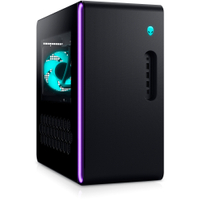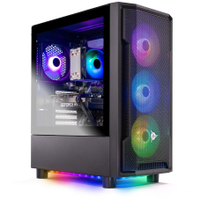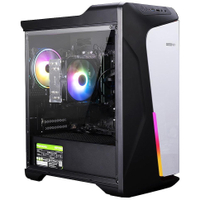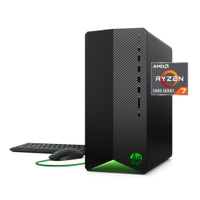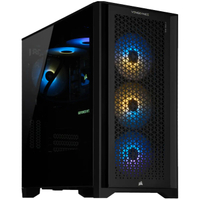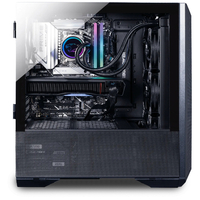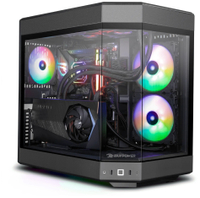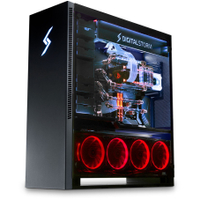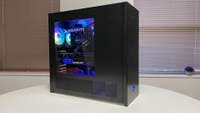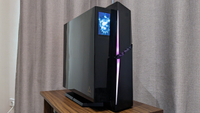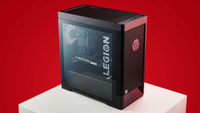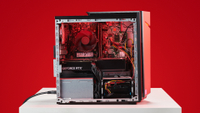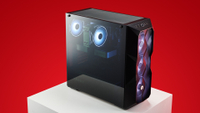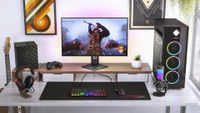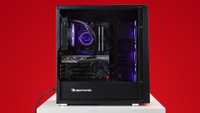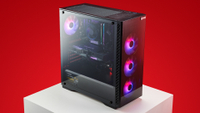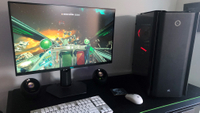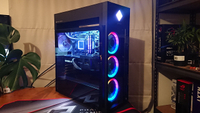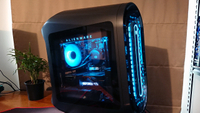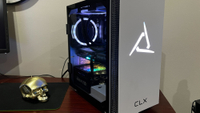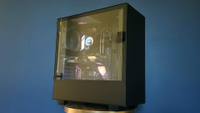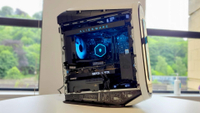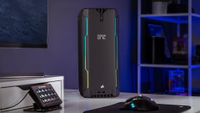
1. The list in brief
2. Best overall
3. Best budget
4. Best high-end
5. Best ultra-enthusiast
6. Best Alienware
7. GPU hierarchy
8. How we test
9. Gaming PC reviews
10. FAQ
Finding the best gaming PC is about choosing the system that matches your needs and budget. It's entirely possible to spend tens of thousands of dollars on a gaming rig if you want to; there's almost no upper limit. But spending your money wisely is a tougher job if you're working to a budget, as most of us are these days.
In my twenty-year tenure as a tech journalist, I've reviewed countless gaming PCs. I've gained insights into where it's beneficial to invest and where compromises can be made. This knowledge is crucial, especially for budget-friendly options. Yet, even when considering a $3,000 PC, you'd want to ensure your investment is sound.
Below, I cover the specs you should expect at any given price point and also, given my experience testing PCs built by many different companies over the years, which gaming PCs are the best for your budget. Testing every system at every configuration in the rich tapestry of gaming PCs is impossible. Still, we've had experience with all the main system builders' work and have extensively tested the core parts in each. We are well-versed in identifying which is the best graphics card at each price point and the processor you'll need to make the most of it.
So whether you've got a tight $1,000 budget or are willing to spend up to $5,000 on your dream machine, we've got the best gaming PC for you.

Ever since building my first gaming PC as a teen I've been fascinated by their guts and have turned poking, prodding, and testing systems into a profession. Over the last 20 years or so I've been testing gaming PCs and have always been more interested in how a manufacturer squeezes the best parts and the best performance out of their budget. But I can't lie, I do love an over-the-top big rig, too.
The quick list

The best overall
The build quality of the Skytech gaming PCs we've tested has been excellent, with smart looks and good cable tidying. Certainly better than I can do myself. So it all comes down to the component choice inside, and this is one of the best prices you'll find the RTX 4070 Ti at in a full PC.

The best budget
This is a good deal for a mid-tier gaming PC, especially when many rigs around this price are only delivering you an RTX 3060. The Ryzen 5 is still a really solid CPU today, and the RTX 4060 is a good budget graphics card, just with the wrong name.

The best high-end
Lenovo is one of the biggest names in PC, and its Legion line of gaming PCs and laptops have gone from strength to strength. We love its latest laptops, and the gaming PCs represent excellent value, too. This RTX 4080 machine also comes with one of the latest Intel CPUs, too.

Ultra-enthusiast
Corsair makes almost every part of a modern gaming PC and knows how to put them together. With the best graphics cards at their hearts, and the finest CPUs, the Vengeance machines pull all that together with a surfeit of Corsair RAM and storage, and arguably the best chip coolers on the market.

Don't buy without a discount
Alienware is one of the most popular gaming PC manufacturers around, but the shine has slowly worn off for us as Dell's corporate grip tightens. The Aurora machines still look beautiful, but the build quality has been lacking in recent years, and the value proposition all but non-existent. The bespoke components aren't premium, and yet carry a premium cost.
The best gaming PC $1,000 - $2,000

1. Best gaming PC: Skytech Chronos
PC Gamer's got your back Our experienced team dedicates many hours to every review, to really get to the heart of what matters most to you. Find out more about how we evaluate games and hardware.

SkyTech machines always pop up when you're looking for the best deals on a gaming PC, and when we've had a chance to check out its systems they've always impressed when it comes to build quality. The only real problem we had with the last SkyTech machine we reviewed was that it's list price was way higher than similar SkyTech machines you could buy from the likes of Newegg. They're well-built, and tidy, too, though that one-year warranty could do with being a bit longer for our tastes.
✅ You want serious 1440p frame rates: The RTX 4070 Ti is able to nail great 1440p numbers, but you will also be able to power a 4K gaming monitor to an impressive extent, especially with DLSS 3.0 and Frame Generation.
✅ You want to boot and forget: There's nothing in this system that screams 'upgrade me!' which means you'll be happily running this rig for years without feeling a desperate need to update it.
✅ You want seriously secure shipping: The Skytech rigs we've tested have come so well packaged that it's almost overkill. But a safe PC is a worthy investment in recycled packaging.
❌ You crave space: The 1TB of SSD storage is about enough for a system at this price, but ideally I'd want more given the current low pricing of SSDs.
❌ You need high-end productivity: The Core i7 12700F is a gaming chip first and foremost. It does have eight full performance cores, but it's not a productivity beast. Skytech has also opted for the cheaper DDR4 motherboard, rather than DDR5, which means you get much slower memory. Not an issue for gaming, but potentially for video editing, etc.
The $1,000 to $2,000 price point is arguably the most important one for PC gaming; this is where the majority of PC gamers will be aiming to spend their budget and for us that's where the best gaming PC really lives. It's a crowded market, but the positive part of that is there are a lot of options to choose from. But this is where it's no longer okay to be going with a last-gen graphics card, because the RTX 4070 and RTX 4070 Ti have now launched and are the best GPUs around this price point.
With RTX 3080 performance from the RTX 4070, and systems on sale for around the $1,500 mark with the latest Nvidia GPU inside it, there's no longer a case to be made for RTX 3080 or RX 6800 XT machines that cost more. And they generally do. The RTX 4070 Ti itself, which you'll find at the top end of the $2,000 budget, offers RTX 3090-level gaming performance, and considering that was a $1,500 graphics card of the last generation which you'd never find close to this price.
I don't think you need to worry so much about last-gen CPUs, as 12th Gen Intel and AMD Ryzen 5000-series CPUs will still carry an RTX 4070 Ti in gaming terms, but that will limit you in terms of memory. The latest generations from both chip makers come with DDR5 memory, which is much quicker for actual memory intensive productivity tasks. You should also not consider less than 1TB of SSD storage, and ideally 2TB at today's prices.
The specs to expect in a gaming PC between $1,000 and $2,000:
- Graphics card: Nvidia RTX 4070 | RTX 4070 Ti
- CPU: Intel Gen Core i7 12th Gen | 13th Gen | AMD Ryzen 7 5000-series | 7000-series
- Memory: 16GB DDR5-5600
- SSD: 1TB PCIe
- PSU: 700W+
The best alternatives:
The best gaming PC around $1,000 or less

2. Best budget gaming PC: ABS Flux Ruby

The Advanced Battlestations moniker might be a little on the nose, but the ABS gaming PCs are essentially now Newegg's own gaming PC range, and deliver great value machines that are really well put together. They're not the most exciting at all, but in our experience are well-built and deliver the performance and components you want at a generally impressive price point. The one-year parts and labor warranty is a touch miserly, but what you would expect around the budget arena.
✅ You're just after a pure gaming PC: That RTX 3060 Ti will deliver excellent 1080p frame rates and good 1440p numbers, too.
✅ $1,000 is your limit: At just under $1,000 this will push your budget to its maximum, but the components on offer will justify that spend.
✅ You're happy upgrading: The SSD will need an upgrade sooner than anything else in this machine, but its B560 motherboard will have a spare M.2 socket and storage has never been so cheap.
❌ You need raw CPU power: The Core i5 11400F is a decent gaming CPU, but its six cores won't deliver much in the way of processing power for streaming or content creation.
❌ You never want to lift a screwdriver again: You will need a new SSD once that 500GB runs out, and that will mean taking the side off, I'm afraid.
When you're looking for a gaming PC under $1,000 then it's all about the spec and the price, regardless of who or where it's from. Well, within reason. So long as the company you're purchasing from has actually successfully sold gaming PCs before, and doesn't have a host of poor reviews, you just want to make sure you're getting the parts you would hope for at this price point.
At the moment that would ideally be an RTX 3060 Ti, which was one of the best graphics cards of the last generation. It's a powerful GPU, not that far off an RTX 3070, and still has no equivalent from within the new generation of AMD and Nvidia cards. But given the RTX 4070 has now dropped, we are expecting an RTX 4060 Ti soon. But that should mean prices on the RTX 30-series should keep dropping with abundant stock. There are still a lot of RTX 3060 GPUs out there, however, so if you can bag a PC with one of those for $700 or less you're doing well.
Alongside that you'll want either a Core i5 or Ryzen 5 processor, but anything from the Intel 11th Gen or AMD 5000-series will be more than enough, and 16GB of RAM. You'll probably only find a ~500GB SSD in these builds, but that's the most affordable upgrade down the line.
The specs to expect in a gaming PC under $1,000:
- Graphics card: Nvidia RTX 3060 Ti | RTX 3060 | AMD RX 6600
- CPU: Intel Gen Core i5 11th Gen | 12th Gen | AMD Ryzen 5000-series
- Memory: 16GB DDR4-3200
- SSD: 500GB PCIe
- PSU: 500W
The best alternatives:
The best gaming PC $2,000 - $3,000

3. Best high-end gaming PC: Lenovo Legion Tower 7i

Lenovo has been killing it recently when it comes to gaming laptops, and it's now building a reputation in the desktop market, too. They're not the flashiest, but neither are the Legion Tower PCs boring Dell boxes, either. RGB is certainly part of their makeup, but they still have a restrained aesthetic that works. And they use standard PC components throughout, making them easy to upgrade. But the best thing is they're often on sale for a discount, and are pretty reasonably priced for their high-end components anyway.
✅ You want a smart, clean PC: Lenovo's Tower design is relatively restrained, though it does have some RGB bling up front and in the Legion logo.
✅ You want it fast: Free delivery on Lenovo machines means you should get your new PC in around three days.
✅ You want support: With one year of Legion Ultimate Support you get 24/7 access to Lenovo's experienced technicians. It also promises gaming specific advice for optimizations on tuning software and hardware for ultimate performance. Best of all you get next business date onsite support.
❌ You play more than two games: The 512GB SSD is miserly, and a real disappointment when you're spending over $2,000 on a PC. It does make this the cheapest RTX 4080 machine around, but it will require an SSD upgrade sooner rather than later.
❌ You want a rig with some flair: The chassis is great for the minimalist, but if you want a showpiece PC for your money then you might want something with a Lian Li O11D or some such case instead.
When you're getting to the rarified heights of the $2,000 - $3,000 price point you're really getting into the elite of gaming PC systems. This is where you can start to pull in some really high spec components. Given that you can get RTX 4070 Ti gaming PCs for less than two grand, you really ought to be targeting either the RTX 4080 or the AMD Radeon RX 7900 XTX at this level.
You can also start to think about high-end CPUs here, too, with Core i7 and Ryzen 7, even Ryzen 9 chips all available within this price range. And that means you're looking at PCs that won't just be fantastic gaming systems, but with effectively workstation-level computational power, too. In this market you should be looking at systems that will make excellent creator machines.
You will arguably see PCs with very similar specs lists at this price point, which means your choice of machine often comes down to secondary considerations, such as shipping time, which brand of components are being used, and such things as warranties and returns. We like iBuyPower RDY machines because of their rapid turnaround from sales which could see you ordering a new rig on Monday and be gaming by Wednesday evening. I also like Corsair's Vengeance machines, because it makes excellent, reliable chassis, SSDs, memory, and cooling itself. Which means it can put high-end supporting parts in your new PC.
This is also where you want to be able to trust the system builders more than just taking a punt on saving $100 on a similar spec, but from a brand you maybe don't know so well.
The specs to expect in a gaming PC between $2,000 and $3,000:
- Graphics card: Nvidia RTX 4080
- CPU: Intel Gen Core i7 12th Gen | 13th Gen | AMD Ryzen 7 5000-series | 7000-series
- Memory: 32GB DDR5-5600
- SSD: 2TB PCIe
- PSU: 850W+
The best alternatives:
The best gaming PC $3,000 - $5,000

4. Best ultra-enthusiast gaming PC: Corsair Vengeance i7400

Corsair has been quietly—and sometimes not so quietly—making some of the best PC parts for years, with only the core componentry of GPUs, CPUs, and motherboards a place it hasn't touched. So, with the best PC cases around, it stands to reason they would make some great full systems. Again, the use of standard components makes upgrading down the line easier, and as it's Corsair you're getting some of the best memory and power supplies around, too. They do generally come in a lot more expensive than the competition, but at this level you really do pay for what you get.
✅ You want the best CPU/GPU combo around: The Corsair machine comes with the best Intel processor and Nvidia graphics card, but doesn't surround it with unnecessary extras simply to hike up the price.
✅ You want a cool and quiet rig: The chassis and cooler combo means you're getting an setup that's able to keep those high-end components running at top speed without getting too shouty. We love the black monolith of a chassis, and Corsair's AIO coolers are some of the best.
❌ You want a statement piece: This isn't some fully water-cooled setup, with hard tubing and multiple radiators, and RGB'd to within an inch of its life. Those can be gorgeous machines, great for a tradeshow floor, but you're paying for a tubed setup that locks you out of system upgrades down the road.
Although $5,000 is a lot of money to spend on a gaming PC, this isn't money-no-object territory and you still want to make sure you're getting the performance you're paying for. That means making sure you're not spending over the odds on useless extras thrown into a build just to hike up the price to make it seem more 'premium' than it really is.
What this budget does mean, though, is you getting your hands on the finest gaming graphics card ever made by humankind. The RTX 4090 is the top of the stack, and the only GPU from Nvidia's RTX 40-series that really does feel like a whole new generation of graphics silicon. It's expensive, but it's genuinely delivering gaming performance you can't get anywhere else.
What you then need to decide is whether you want to go AMD or Intel for the supporting cast. The Intel 13th Gen Core i9 chips are excellent gaming processors, and deliver a huge amount of multi-threaded performance for any kind of productivity workload you'd care to throw its way. But, on the flip side, the Ryzen 9 7950X3D delivers the highest potential gaming performance you can get from a CPU thanks to its 3D V-cache chiplet.
That extra cache will mean your high-end GPU has the best chance to shine, and the 16 full cores of Zen 4 processing means you still get workstation-level productivity chops, too. All that said, there are really only a few frame per second in it between the Intel and AMD options when you're talking about the sorts of high resolutions you're going to be pushing the RTX 4090 through.
When you're spending this much you could consider going all out on a full closed-loop liquid cooling array. Such systems look spectacular, and genuinely give off that dream machine vibe. Though how effective such arrays are is more debatable. If you're spending big on a system because you want someone else to build you a top-end rig and don't ever want to touch it, such a rig would be great. But if you ever want to get involved with upgrading your core components a closed loop is a real pain in the butt to maintain. Given the diminishing returns of overclocking modern components, such extreme cooling is also not entirely necessary, either.
The specs to expect in a gaming PC between $3,000 and $5,000:
- Graphics card: Nvidia RTX 4090
- CPU: Intel Core i9 13900K/F | AMD Ryzen 9 7950X/3D
- Memory: 32GB DDR5-5600 minimum
- SSD: 2TB SSD
- PSU: 1KW
The best alternatives:
Alienware

5. Best Alienware gaming PC: Alienware Aurora R15

When I was a whelp I used to hanker after Alienware PCs and laptops, but as I've gotten older, so Alienware has changed. It's become more and more like its corporate Dell overlord, and far less tantalising a prospect. My biggest issue is the use of proprietary components, which would be fine if they were the finest, and beyond reproach, but you will find other equivalently priced builds with superior motherboards and power supplies that you can also upgrade in the future. And price is definitely an issue, too, with the Alienware premium not really buying you anything tangible for the extra. I will reiterate my mantra, never buy a full price Alienware, because they only become worthwhile with a hefty discount.
✅ You just want plug and play: Alienware machines will just work out of the box and with the might of Dell behind it you can be relatively confident that you'll be looked after if something goes awry.
✅ You're into the aesthetic: Alienware rigs look good, and unlike any other machine on this list. The curvy chassis are a world away from the boxy towers otherwise used. But they certainly are big...
❌ You want peak performance: We've not had great experiences with recent Alienware machines delivering the performance their parts ought to. That's often down to the bespoke nature of the components and sometimes ineffective cooling.
❌ You want to upgrade your PC in the future: No PC is truly future proof, no matter how much you spend, so either you upgrade your rig, or you buy a new one. With Alienware, you're largely locked into the latter by its use of bespoke motherboards, chassis, and PSUs.
❌ You want value for money: The deal above is a rarity for Alienware PCs. More often than not you'll be paying well over the odds for a machine that performs notably worse than an equivalently priced system from pretty much anyone else.
Alienware is one of the biggest names in gaming PCs, with a heritage stretching back to the dawn of time. Well, 1996 anyway. With a penchant for stylish designs and high-performance hardware it cemented its place in the burgeoning sphere of gaming-focused PCs. In 2006 it was bought wholesale by corporate PC giant, Dell, and that helped bring an economy of scale to the brand that previously it didn't have access to.
But that hasn't necessarily meant those economies of scale have been passed on to the consumer, as Alienware has always kept itself as a premium tier brand within the Dell portfolio. Which was fine when it was offering a premium experience to the people who bought its PCs.
For years we have had Alienware on the top of our best gaming PC lists, because historically its systems could be relied upon to deliver a top-tier experience and premium performance. In recent times, however, we've reviewed different Alienware gaming PCs and have found they fall short of our expectations. Given some performance issues, cooling problems, and concerns around bespoke components, we would categorically say you shouldn't buy a full price Alienware PC and only look to pick one up when they are heavily discounted.
The bespoke components used inside them sometimes fall short of the sort of performance you'll get out of motherboards, coolers, and power supplies you can buy from other named brands, such as Corsair, Asus, or MSI. They are also generally designed specifically for use exclusively inside Alienware's own chassis, which means those cases don't allow for third-party upgrades down the line. At least not without some serious modifications. At best that locks you into the Alienware/Dell ecosystem of high-priced hardware, and at worst locks you out of upgrading your expensive rig at all in the future.
GPU hierarchy: How do the GPUs stack up?
The most important component for any gaming PC build will always be the graphics card. That will give you the best idea about how one machine matches up with another just in terms of raw gaming performance.
Below, we've listed the slew of GPUs we've had over the past couple of years listed in terms of their Time Spy Extreme index score as a way to put them in some consistent hierarchy. This doesn't cover the performance difference between graphics card in every instance, as differences in how they handle ray tracing other graphical effects can play a part. But this is a handy one-shot method of getting a rough idea of how the various cards from these various generations of GPU stack up against each other.
Click the button in the top right to enhance!

How we test gaming PCs

We spend a lot of time testing gaming PCs to ensure that we know what sort of experience you would get should you spend your hard earned cash on one. Experience is an important factor—you want to know that pulling your new rig from its box that it's going to work as soon as you plug it in, and let you get up and gaming as soon as you can download your favourite games.
But the general feel of using a PC is one part of it, it's also important to get the relative performance numbers to be able to see how a given machine performs in games compared with other systems. We run a selection of benchmarks to gauge CPU performance, storage performance, and of course gaming performance.
We are now using Cinebench R23 and X264 to test the processor—which will tell you both how good the CPU is, as well as how good its cooling is—and Final Fantasy XIV Shadowbringers and 3DMark to test the storage inside a PC. For the gaming side, we use 3DMark Time Spy, Hitman 3, Metro Exodus Enhanced Edition, F1 22, Far Cry 6 and Warhammer III to give us 1440p frame rate metrics.
We will get inside the machine to see how well built it is, and how well the builder has tidied up the mass of cabling that always lurks inside a gaming PC. It's also important to know how much of an upgrade path a system might have, whether there is space inside for a extra storage, or more memory, etc.
Value is also a key concern for us. A gaming PC represents a large outlay, and no matter whether it's a $900 or a $5,000 machine, it still needs to be able to justify its cost by the quality of the build and the components inside it.
Gaming PC reviews
Gaming PC FAQ
Why buy a prebuilt gaming PC?
One of the most significant advantages of building your PC is the ability to hand-pick every single component in the system. This enables you to take your time shopping around for deals and finding the best combination of parts to fit your budget and performance needs. The downside for most inexperienced builders is that this process can take some time and cause quite a headache if something goes wrong. You only get warranties on the individual components, not your finished build, and this is where the best prebuilt gaming PCs shine.
What do you get for your money in a prebuilt PC?
When you pay the premium to configure or purchase a prebuilt PC, you pay for more than just the parts. You pay for warranty service, support, and peace of mind that professionals put your system together. These are some of the things we value highly when considering what the best gaming PC is. We also look at other selling points, like design, upgradability, and anything you wouldn't be able to do when building it yourself.
What sets a prebuilt machine apart from a DIY build?
One of the most significant factors that make PCs stand apart from the competition is the design. Prebuilt systems like the Alienware Aurora R10 or Corsair One use unique in-house chassis designs you wouldn't be able to purchase when building it yourself. You can take some comfort in knowing that these systems were designed and built specially to house your configuration, though that can make upgrading more awkward later on down the line.
When we set out to choose our top choices of prebuilt gaming PCs, we look at almost every major manufacturer and system integrator to find the best combination of value, reliability, customer feedback, design, and performance for various budgets and needs.
